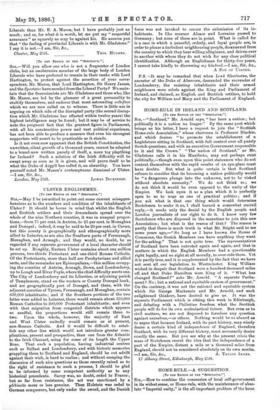HOME-RULE IN IRELAND AND SCOTLAND.
[To THE EDITOR OF THE "SPECTATOR."]
SIR,—" Scotland," Mr. Arnold says, "has been a nation ; but politically it is a nation no longer." By the same post which
brings us his letter, I have a request to join the "Scottish Home-rule Association," whose chairman is Professor Blackie, and which desires "to promote the establishment of a Legislature sitting in Scotland, with full control over all purely Scotch questions, and with an executive Government responsible to it and the Crown." "The nation of Scotland," as Mr.
Gladstone calls it in his Manifesto, may not perhaps exist politically,—though even upon this point statesmen who do not content themselves with the rapid results of an eye-glass must have doubts. But what is quite certain is that Scotland refuses to consider that its becoming a nation politically would be "a dangerous plunge into the unknown, not to be risked without absolute necessity." We do not think so ; we do not think it would be even opposed to the unity of the Empire. We look upon it as a plan which it is perfectly
open to us to urge as one of practical politics ; and if you ask what is that one thing which would determine Scotchmen to make it so, I shall hazard a somewhat uncivil reply,—it needs only the denial by the English people and London journalists of our right to do it. I know very few
Scotchmen who are disposed in the meantime to join this new Association ; bat what is the reason of that ? The reason is partly that there is much truth in what Mr. Bright said to me some years ago,—" So long as I have known the House of Commons, the Scotch Members can have anything they want for the asking." That is not quite true. The representatives of Scotland have been outvoted again and again, and that in matters in which the English Members had a questionable
right legally, and no right at all morally, to over-ride them. Yet
it is partly true, and it is supplemented by the fact that we have not sent all our legislation to Westminster. King William wished in despair that Scotland were a hundred thousand miles off, and that Duke Hamilton were King of it. "What has changed Scotland ?" asks Mr. Arnold. "A separate Parlia- ment ? No; but a rational and equitable system of government." On the contrary, it was not the rational and equitable system which Sir George Mackenzie and Mr. Arnold, and such enlightened thinkers, have desired to give us. It was the separate Parliament which is sitting this week in Edinburgh, and debating with a Philistine freedom what the Scottish people will do for its own ecclesiastical future. But even as to civil matters, we are not disposed to foreclose any question against ourselves,—or others. Nothing would be so absurd as to argue that because Ireland, with its past history, may wisely desire a certain kind of independence of England, therefore Scotland, with its very different history, must necessarily desire exactly the same. But you see why at the present crisis the mass of Scotchmen resent the idea that the independence of a part of the Empire, distant a mile or a thousand miles from England, should not be considered absolutely on its own merits.


































 Previous page
Previous page